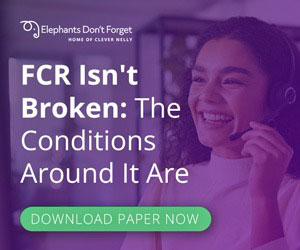Lisa Binney looks at why many contact centres are inadvertently failing to recognise their best performers.
Going back 20 years when I was first working as a part-time contact centre agent, I remember our centre manager deciding to start recognising ‘top performing’ staff. I worked in a small 80-seat inbound centre where sales wasn’t a focus, so it wasn’t immediately obvious how this would be done.
However, as someone who felt they did a really good job day in, day out – calming down irate callers, handling others with care and attention and never intentionally taking unnecessary time off the phones – I was quietly, if slightly arrogantly, confident that I’d be up there in the top 5.
I can still recall my utter disbelief to find myself ranked around 45th – not even in the top half of the table!
My rivals were colleagues who quite frankly ‘could do better’
So who were my big rivals? Those who’d now be getting gift vouchers, extra time off and a jolly pat on the back…? Frustratingly, I saw that they were colleagues who quite frankly ‘could do better’.
I frequently ended up handling callers who’d been given misinformation by these people, and I often heard them snapping and having an attitude on the phone.
What was making these people the so-called ‘top performers’? Well, plain and simply, they took the most calls! And so began my 20-year irritation with this often bandied around ‘award’…
Dispense with ‘please’ and ‘thank you’ and those saved seconds soon add up
Within the year, I was managing teams of agents and soon found out why some of these people handled so many calls.
- Let’s dispense with ‘please’ and ‘thank you’ on the calls – all those seconds shaved off soon add up!
- If a customer ordered some goods which they needed in the next few days, let’s not bother explaining that they have to allow 28 days for delivery, that’s a discussion that’s also going to eat into your time.
- Even better, let’s even ‘lose’ a couple of calls.
- I’m sure they only meant to turn the volume up on the phone when they somehow managed to disconnect the call… Strange how this only tended to happen on what appeared to be a problem call that might take some time to deal with!
It was with little satisfaction that I had to point out to the other supervisors that one of their prize staff was actually disconnecting around 20% of the calls she took every day.
Maureen took fewer calls but never received any poor feedback
I compared these agents to Maureen, who was always being pulled up on the fact that she didn’t take enough calls. Maureen had worked there several years and was a good steady worker. She needed the minimum of supervision but admittedly she would take half the volume of calls that some of these ‘stars’ did.
However, by comparison, we never received any poor feedback about her. In fact, quite the opposite – customers used to actually write in to compliment Maureen (and this is in the days before online feedback so it really did take effort on the part of the caller).
If Maureen wasn’t 100% sure the info she was giving out was accurate she’d happily put the customer on hold and make enquiries. She would independently make follow-up calls to the customers to ensure everything had been sorted and she wouldn’t promise anything that she couldn’t guarantee.
All her calls were polite and, while she could have cut back on the chat with some of the callers, I’d have happily had a room full of agents like her any day. More first call resolutions, and repeat custom soon outweighed the fact that she didn’t bang through calls like a robot.
Many agents are still rewarded for the sheer number of calls they handle
I was therefore surprised, upon my recent temporary return to Operations, to find that these measurements still go on to assess the cream of the crop.
The purpose of the calls for one particular project was to confirm that people could still keep medical appointments – so no sales, no opportunity to get them to change their mind, just a courtesy call to see if the customer could keep their appointment.
Yet the ‘Top Performer Award’ was linked directly to agents whose customers had said that they would keep the appointment! Nothing to be said for the person who had to calm down situations whereby people had already cancelled these appointments, or those who took the time with callers who had to rearrange or organise transport, or even those who had to tactfully deal with the awkward situation of handling a call where the patient had died.
As far as the ‘best agent’ measurements were concerned, unless you could wrap that call up with a “Yes, I’ll be keeping the appointment”, then it appeared your work counted for nothing.
Regrettably, I wasn’t in a position to delve deeply into their call stats or call monitoring to see if these ‘top performers’ were yet again, coincidently, the ones who had a higher percentage of short calls, especially with problem callers.
However, my calculations left me very suspicious. After all, they needed call after call of the ‘yes, yes, yes’ type patients to constantly achieve the figures they were hitting. Yet, day after day, the same names were the stars of the show.
These types of rankings demotivate staff who take care with their calls
Unfortunately, as the alternative is much harder to measure and manage, these ‘Most Calls/Most Appointments’ kinds of rankings will no doubt be here to stay.
They are easy to produce and will continue to demotivate staff who do actually take a bit of care on their calls. However, should I ever go back into Operations full time, I’d certainly be pushing my staff to be more like Maureen than the “Quantity over Quality” brigade.
Not convinced? Try asking yourself – as a customer with a problem – which of the two agent types would you prefer to be put through to… Then ask yourself who your real Star Performers are!
Written by: Lisa Binney, who has worked in the outsourced contact business for over 20 years.
Author: Guest Author
Reviewed by: Megan Jones
Published On: 4th Mar 2015 - Last modified: 30th Jan 2026
Read more about - Call Centre Management, Employee Engagement, Management Strategies, Motivation, Performance Management









































Lisa, can’t agree more. Quality over quantity. Total calls isn’t even the tip of the iceberg when looking at agent performance. Thanks for sharing.
I too am having this struggle in the contact center where I supervise. It seems that our struggle at the time is Average Handle Time and our stars are those with the lowest times. However, after careful analysis we are discovering a horrible trend of calls being dropped by these same “stars”. I am tempted to share this article with my management team, but hate to be seen as someone that “doesn’t believe in the program”. Help!!!
Unfortunately some call center managers focus on incentivizing and rewarding the wrong part of their staff. There are polar trains of thought in this area. Some believe your high output/high earners can be left to their own abilities and you should spend time with your lower earners, educating and coaching in sales, etc. I believe you should get rid of the low earners and spend 80% of your time with the top 20% of your team. Keep them on the phones, but focus on anything and everything that can get them to close more deals. These people are your bread and butter, incentivize them and focus on their needs.